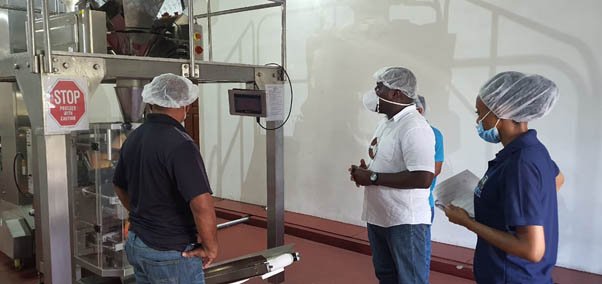Keen to ensure compliance by local manufacturers with high food safety standards as the novel coronavirus challenge seemingly grows increasingly more formidable, the Government Analyst-Food and Drugs Department (GA-FDD) on Saturday last undertook an inspection visit to the operations of the Morning Glory Rice Cereal Factory at Anna Regina to review the level of its adherence to the food safety protocols ahead of the facility being granted clearance to continue production beyond this year.
It was the first such visit since the GA-FDD was accorded the status of International Standard Organization (ISO) 17020 by the American Association for Laboratory Accreditation (A2LA) back in August this year. The (ISO) 17020 conferral now allows the GA-FDD to conduct inspection activities at local factories and to ‘clear’ some goods produced locally for acceptance on external markets.
The visiting GA-FDD team to the Anna Regina facility which was led by the entity’s Director, Dr Marlan Cole, reported after the visit that it was impressed with the layout, cleanliness, record-keeping regimen and general conditions that obtain at the factory. While alluding to “minor infractions” which Cole said were “easily remediable,” Cole said that the visiting GA-FDD team underwent “the routine” of securing samples that will be subjected to analysis to provide information regarding yeast and mold as well as “moisture and water activity levels,” which pursuits he said were consistent with the parameters to allow for a satisfactory determination of a regimen of standards that applies at the factory and by extension provides information with regard to the quality of the product.
Cole told Stabroek Business that following Saturday’s inspection, the Anna Regina factory has been cleared to receive a licence to continue manufacturing in 2020 and beyond, which the GA-FDD will be issuing shortly.
Commissioned in February 2017, the factory manufactures a brand of rice cereal using primarily broken rice, rice bran, molasses, and sugar, along with other ingredients like salt, baking soda, and a fortifying vitamin cocktail.
The factory reportedly has the capacity to produce in excess of 200 kilogrammes of product per hour, the equivalent of five hundred boxes of product. Operating three shifts, the factory reportedly has the capacity to manufacture 1,000 metric tonnes of cereal in a calendar year.
The factory supplies several local entities including supermarkets across the country and also enjoys a limited overseas market.
Cole told Stabroek Business that setting aside the “practical purpose” for the team’s visit to the Essequibo factory, the opportunity came at a time when, in the light of the prevailing COVID-19 pandemic and the attendant need to ensure a significantly enhanced level of standards oversight in the foods industry, the GA-FDD was making a deliberate effort to publicly underline its role and underscore its relevance.






